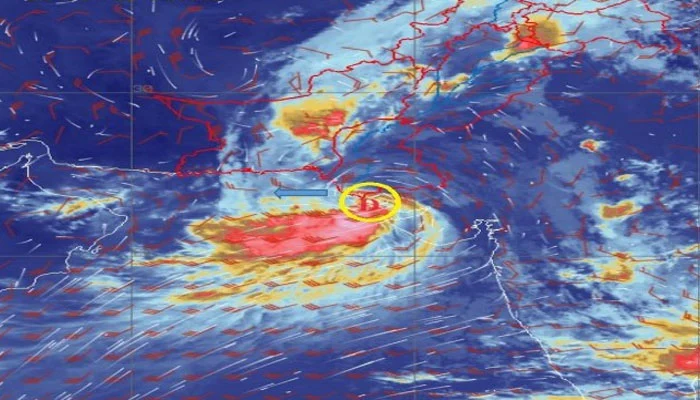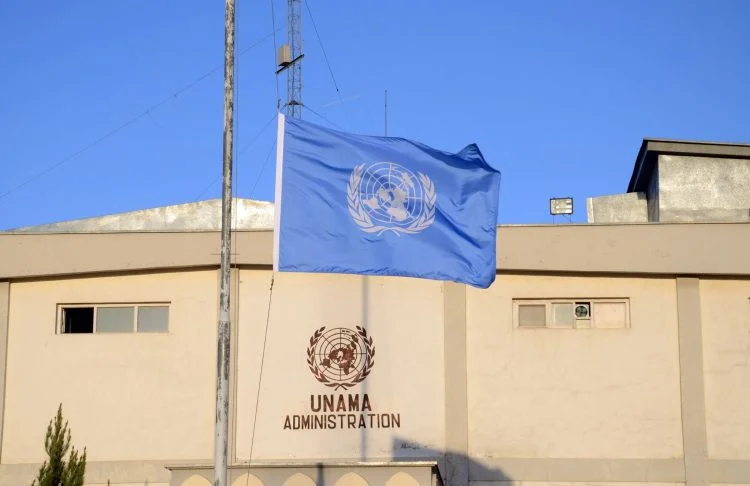KARACHI: The deep depression of Cyclonic Storm ‘ASNA’ is gradually moving towards the Arabian Sea from India’s Rann of Kutch. It is now 170 kilometers southeast of the port city. The Pakistan Meteorology Department (PMD) issued this warning on Friday.
In its latest alert, the PMD reported on the deep depression. The low-pressure area is now located approximately 170 kilometers southeast of the port city.
It further stated that it lies around Latitude 23.5 N & Longitude 67.9 E at about 170km south/southeast of Karachi and 88km south of Kati Bandar.
Cyclonic Storm ‘ASNA’
Cyclonic Storm ‘ASNA’ will strengthen and bring widespread rain, thunderstorms, and urban flooding to Sindh and Balochistan, according to the NDMA’s August 30 alert. Currently 170 km east of Karachi, the system will shift west-southwest and strengthen into a Cyclonic Storm by Friday evening. Forecasts predict heavy rain and strong winds for Karachi, Tharparkar, Badin, and nearby regions. At the same time, Hub, Lasbela, Awaran, Kech, and Gwadar will experience rain and thunderstorms with isolated heavy downpours from today until Sunday.
PMD Director General Mehar Sahibzada Khan spoke at a press conference. He said that the cyclone, named Asna, brewed off the Karachi-Gwadar coast. This could result in heavy rainfalls after it hits the western coastal areas.
“Cyclones usually advance from sea to land but Asna’s advancement is vice versa […] It will intensify into a hurricane whose impacts will be seen in the next week,” he added.
“Our country is receiving more than usual downpours due to this cyclone. Upper areas of the country will experience more rain from September 2 to 4.”
Mehar predicted that the weather conditions would improve in southern areas after two days.
Furthermore, the PMD has also forecast a possibility of heavy rainfall in the provincial capital of Sindh with strong winds and thundershowers in the next 24 hours.
Heavy Rain and Flood Alert
The meteorology department’s forecast on Friday recorded the minimum temperature in the metropolis at 26°C while the maximum temperature in the city is likely to be 28°C to 30°C.
Meanwhile, winds in the metropolis are blowing from the northeast at a speed of 22km/hour.
According to the Met Office, heavy rainfalls are likely in Sindh areas under the influence of the potential cyclonic storm.
These areas include Karachi division, Tharparkar, Badin, Thatta, Sujawal, Hyderabad, Tandu Muhammad Khan, Tandu Allah Yar, Matiari, Umerkot, Mirpurkhas, Sanghar, Jamshoro, Dadu and Shaheed Benazirabad districts till August 31.
Additionally, heavy downpour is also likely in Hub, Lasbella, Awaran, Keach and Gwadar districts between August 30 to September 1 with occasional gaps.
Heavy rains may cause water logging or rain inundation in low lying areas of the Sindh-Makran coast while sea conditions are likely to remain rough with squally winds of 60-70kph gusting 80kph.
The PMD advises fishermen in Sindh to avoid venturing into the sea until August 31 and those in Balochistan until September 1. The department also advises residents to avoid unnecessary movement.
This news is sourced from The News and is intended for informational purposes only.






